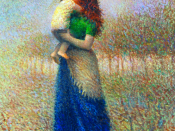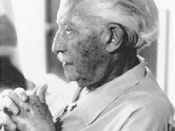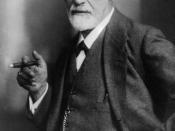Erikson's Theory of Human Development is one of the most well known theories of personality in psychology. Erik Erikson was a Fruedian Ego-psychologists, meaning that he accepts Sigmund Freud's ideas as "basically correct", but he was more society and culture-oriented than other Fruedians. Freud had developed five stages, but Erikson had elaborated them into eight. Frued believed that people develop their personality in five stages and only up until adolescence, whereas Erkison elaborated on this theory, giving adulthood three more stages. (Boeree) Erikson believed that people never stop developing, but rather keep going through adulthood, and that each of these "crises" must be dealt with one at a time, before moving on to the next. (Psychology, 521)Like Frued, Erikson believed that parents, as well as grandparents, dramatically influence child's behavior, which leads us to the first stage. The first stage (Trust vs Mistrust) is said to be very much dependent upon the maternal relationship, and is where trust is developed.
From the time a child has their first birthday, up until about eighteen months, he or she depends on their parents to give them the things that they need, such as food, or clean diapers, and not to reject them or cause them harm. This is a very delicate balance, and when achieved will the child will believe that no matter what happens, everything will work out in the end. This is helpful later in life when disappointments in love, success or other aspects of life come along. (Boeree)The second stage (Autonomy vs. Doubt) occurs when the child is eighteen months to four years old and helps him or her to build self-confidence and control by letting them exploring their independence. (Boeree) This stage is the point where a child learns potty training as well as how dress and feed...


